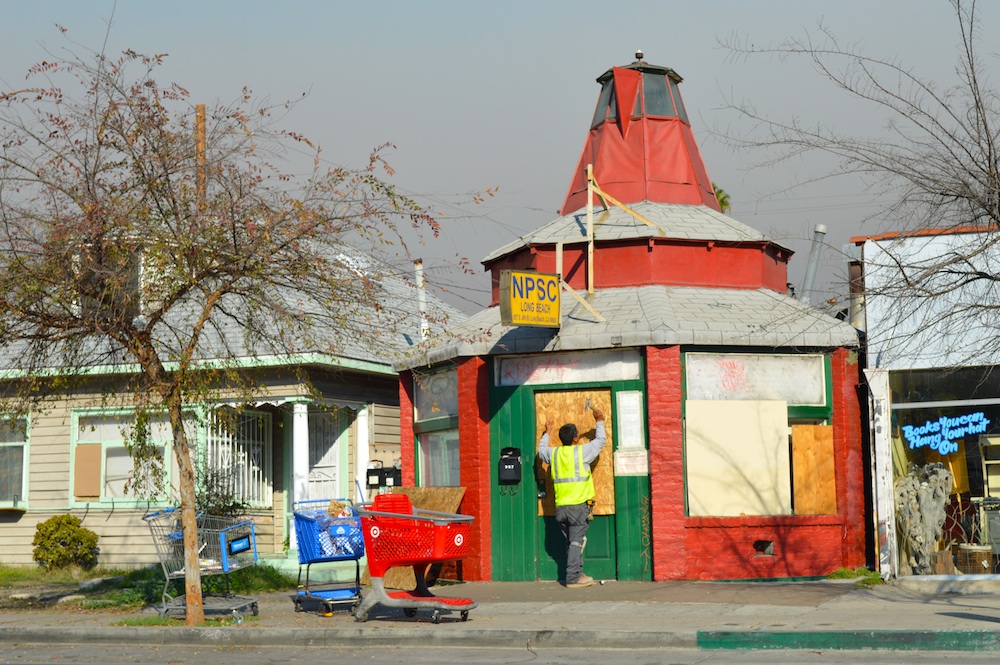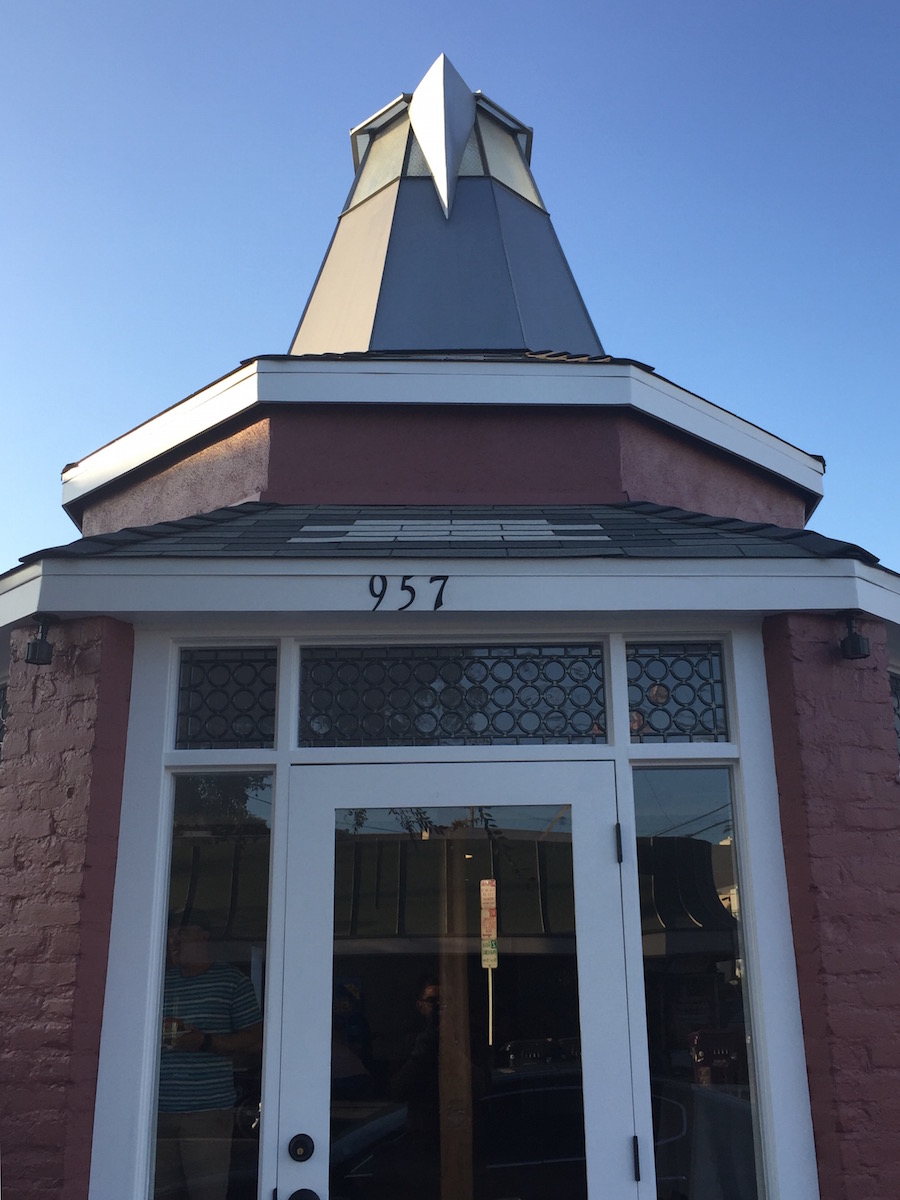Frank Alvarez (left), Owner Eric Winkler (center), Katie Rispoli Keaotamai and Martin Porter (right) pose in front of the newly rehabilitated Koffee Pot Cafe on 4th Street. Photo by Jason Ruiz.
Just over two and a half years ago, the Koffee Pot Cafe was nearing the verge of being condemned to demolition, but now the quirky Great Depression-era building on 4th Street has been fully rehabilitated and is awaiting a new tenant.
The quest to fix the structure that had been deemed a nuisance, and possibly a public safety issue, started when new ownership reached out to local nonprofit We Are The Next (NEXT), which focuses on renovating historic spaces to preserve their value for future generations. The organization’s executive director, Katie Rispoli Keaotamai, hosted an open house Thursday night to showcase the progress of those rehab efforts.
“This was something that was made possible by a collection of people who all came together,” Rispoli Keaotamai said to a small group that filled the renovated Koffee Pot. “Not just the people who worked on the project and own this building, but people who are part of the community who have all been invested in seeing this building through and wanting to see how it’s doing and what we were up to on a regular basis.”
RELATED
Famed Koffee Pot Building Up For Destruction; Faces Uphill Fight with Long Beach Preservationists
Some parts of that rehabilitation were more arduous than some, and others were simply impossible to replicate because of a lack of photo records. The natural wood pole, which supports the coffee pot, has been fully restored, as were the concrete floors which still reflect the ghost outlines of the former counter space and dining areas. The crew was even able to re-dig the original planters and re-construct the stained-glass globe that sits atop the Koffee Pot.
However, the stained glass windows adorning the front of the structure were replaced with regular leaded glass, something that left some attendees longing for the colored glass that graced the building during its heyday.
“We didn’t do color, both because we wanted to bring light inside, and also because we don’t have any documentation of what the original color was,” Rispoli Keaotamai explained about the decision to go with transparent glass. “So rather doing what’s called reconstruction, which can sometimes be based on conjecture—or some people call it ‘Disneyland Preservation’— where you guess at what was originally there, rather than go that route, we decided to make them like in pattern, which we can tell from photos.”
 Stained glass or not, the property has come lightyears from where it was when the rehabilitation projected was broached with the new owner, Eric Winkler. The 26-year-old owner said he didn’t know he had purchased a historical property, but he did see a project that seemingly nobody else wanted a piece of.
Stained glass or not, the property has come lightyears from where it was when the rehabilitation projected was broached with the new owner, Eric Winkler. The 26-year-old owner said he didn’t know he had purchased a historical property, but he did see a project that seemingly nobody else wanted a piece of.
“A lot of people have seen it, they passed it, they wouldn’t touch it for the life of them,” Winkler said. “But it’s 150 percent better than it was. The difference is incredible.”
Because of the historical significance, there are certain portions of building that have some strings attached. Certain character-defining features, like the wood pole supporting the coffee pot, the concrete floors, the planters, the exterior brick texture and window frames are protected, everything else is freed up for interpretation by the new tenant.
“The ideas with projects like this, when you have something that’s historically designated or protected property, is you really want to be able to ultimately not be disturbed is someone were to change it and then leave,” Rispoli Keaotamai said. “Basically anything that a new owner or tenant would do would need to be considered reversible.”
The Koffee Pot is part of three properties that exist on the land parcel and are owned by the Winklers. The two houses located to the west of the historic structure could be eventually marketed as commercial properties, to coincide with whatever tenant takes up residence at the Koffee Pot, but for now the cafe site is the only one being shopped. The properties are jointly listed on the group’s website for $2.3 million.
Martin Porter, director of National Retail Group at Marcus & Millichap, said that for now, the group is trying to place an established business, either local or regional, that can step into the space and be successful long-term. He hopes to land a tenant that will operate a coffee, tea or cafe-based operation and is optimistic that can be accomplished in the immediate future.
 “This week has been a big week of ‘wow, it’s really ready to go,’” Porter said. “So our interests have come forward. We’ll probably have someone into planning in the next 45 days and have something hopefully open by October 1.”
“This week has been a big week of ‘wow, it’s really ready to go,’” Porter said. “So our interests have come forward. We’ll probably have someone into planning in the next 45 days and have something hopefully open by October 1.”
Porter said that if the new tenant wishes to do so, there’s the possibility to expand to have a parklet situation similar to other establishments on Retro Row, like Lola’s and Berlin. Given the amount of time and effort put into resurrecting the property, Porter said the owners are willing to invest in the tenant to make sure the business sticks around for a while.
Rispoli Keaotamai said this was important, given the rapid turnover that the building has seen in its history, noting that the work that’s just been completed has been the first true investment in the property in nearly 75 years. On a personal note, she’s hopeful the new tenant is someone who cares about the city and cares about the building, to ensure it’s taken care of.
And as far as what that business is, she kind of spilled the beans.
“I can’t wait until I can just come here and grab a cup of coffee on my way into the office,” she said.

